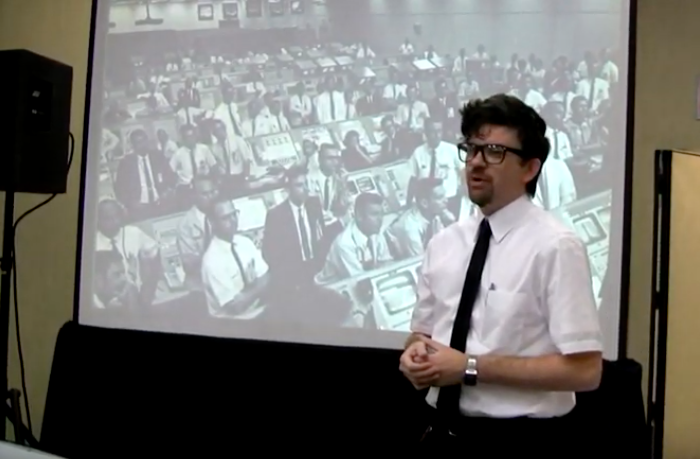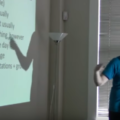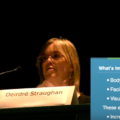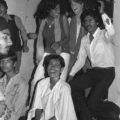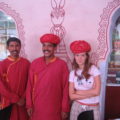Metrics Workshop at LISA13
At USENIX LISA`13, Brendan Gregg led a Metrics Workshop, along with Narayan Desai, Kent Skaar, Theo Schlossnagle, and Caskey Dickson. “This was an opportunity for many industry professionals to discuss problems with performance metrics and monitoring, and to propose and discuss solutions.” More details from Brendan here.
I filmed the day, above is a playlist of all the resulting videos. Below is the gallery of photos from all of that edition of LISA, which was… eventful.
Storyteller
My dad was a virtuoso storyteller. He could hold a roomful of people spellbound, recounting events from his life and others’ with wit, style, and humor.
Most of his stories he presented as fact and, for the ones I could personally vouch for, this was mostly true. He was not above embellishing for effect, but his life had contained so much real adventure that this was hardly necessary.
(Having a storyteller in the family has its drawbacks. The storytelling art must be practiced, each story burnished to a shine by retellings to different audiences. As a family member, you hear those stories over and over again, and some you get tired of – a common complaint, especially among storytellers’ spouses!)
As he became increasingly house-bound in his later years, I urged my dad to write things down, to capture those stories forever and share them online. I knew that people would enjoy them, and the interaction with an online audience might alleviate his boredom and isolation.
But he never did. Partly because he was working for many years on a sprawling, complicated novel, the research for which led him eventually to a quite serious attempt to convert to Judaism. But maybe he also resisted because, to write down the stories and finally capture them in text would be to acknowledge that he might not always be around to tell them in person.
Whatever the reason, he did not write down his stories. When he died, one of my first reactions was regret that he had not. All those wonderful stories should not be lost! I wondered if I should try to write them down, but quickly decided against it. I had already lived much of my life as my father’s audience. It’s time to tell my own stories. Where our story lines run parallel and his stories are also my own, I will tell them, and maybe a few more, strictly his, that happen to crop up in my mind. But I will not make a concerted effort to be his scribe. I have plenty of stories of my own!
Yes, I have inherited the storyteller mantle. It’s only since his death that I can admit that I am my father’s daughter in many ways, including (perhaps above all) this one. Now I’m the one who entertains people (at least, I hope it’s entertaining) with stories from my rich, strange life. Sometimes when I do, I catch echoes of him in my own voice, gestures, and physical presence. I’m not large enough to have his rich, booming laugh, but I do have his sense of humor and delight at the vast, ironic complexity of the world and everything in it. And that’s a fine inheritance.
Memory, Truth, and the Stories of My Life
My parents’ divorce was a textbook study in “how not to handle your divorce with your kids”. The bitterness, acrimony, and cycles of revenge lasted for decades, and led, among other things, to my decision a few years ago to have no further contact with my mother. But there were earlier periods when I asked them both questions about the whole mess, trying to understand what had happened and why. Their responses were at best confusing and contradictory. I ultimately came away with the meta-lesson that, where strong human emotions and motivations are concerned, there is no such thing as absolute truth.
If I had been able to record every moment of my life, I’d be able to play back an event, such as a marital spat, and know exactly what was said by whom. But I still wouldn’t know for sure why it was said or what the speaker was feeling at the time – even when that speaker was me.
Our emotions, decisions, and reasons are not completely comprehensible even to ourselves, even as they are occurring. Some feelings are too intense or too painful to grasp even as we are feeling them. I have had conversations (or arguments) in which I realized that, from one moment to the next, I had already erased the memory of what was just said, perhaps because it was too overwhelming. Sometimes I later recalled those words, sometimes I never did. I’m sure I remember many of my life’s events incorrectly. We all do. Under the pressures of time and emotion, events become telescoped or conflated in our minds, some are made up of whole cloth, others completely forgotten. Some are edited into a form more flattering, or at least palatable, to ourselves. As actor Willem Dafoe once said: “The bad guy never thinks he’s the bad guy.”
Recent brain research is finding that we edit our memories continuously throughout our lives, not just discarding those which are no longer important, or deleting (temporarily or permanently) those which are painful, but also re-editing and re-interpreting old memories in light of later experiences and feelings. Age means having a wealth of prior experience and knowledge against which to measure both new and old experiences. We are capable of constantly drawing new lessons from past events (when we choose to do so – that is what wisdom means, I believe).
It was a relief to me to realize that, when I share my stories, I need not strive for an objective truth that some neutral third party might agree upon – because no such objective truth is possible. Objective truth may be available about what was done or said (if we can remember accurately, or have other evidence), but not about why it was done or said.
So, let us be clear: the stories I tell do not claim to be objective recountings. These are my stories as I remember and currently interpret them. They may be subject to re-interpretation and change at any time. If you were part of any of these stories, you may or may not agree with my memory or interpretation of them. You have your own truths, just as I do. And that’s okay with me.
Yes, All Girls
I’m trying to remember how young I was when I first realized that, as a girl, I was more likely to be a target than boys were.
It might have been when I joined an inner-city Pittsburgh school for 5th grade. I had problems fitting in there. I was already a weird, traumatized kid, just returned to the US due to my parents’ divorce after being raised in Thailand. It’s not surprising that I was teased a lot in school. Many kids were (and still are, only now it’s called bullying.) But there’s always specific content to teasing. Let’s examine the taunts that were leveled at me.
One of the things I was teased about was my butt, which stuck out, or at least people told me it did (perhaps I was a bit sway-backed). A pop song that had been popular before I returned to the US in 1971 had a line about “Bertha Butt, one of the Butt sisters”. I had never heard the song, and was baffled (and hurt) when one of the boys in my class sang that line at me. Over and over again.
Continue reading Yes, All Girls





